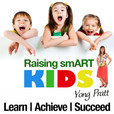
Summary: 5 Ways To Get The Most Out Of Music Lessons In our years of teaching music at Academy of the Arts, we’ve discovered 5 practical tips to help our students get the most out of music lessons. 1. How young is too young? Starting at the right age Adult students can start any instrument at any time. Their success is based on how willing s/he to commit to practicing. If you have a desire to learn an instrument, don’t let age get in the way. We’ve taught adults in their 50‘s and 60‘s. Starting at the right age for kids is a key to their success in lessons. Some people will tell you “the sooner the better” but this attitude can actually backfire and be a negative experience. If a child is put into lessons too soon they may feel overwhelmed and frustrated and want to stop lessons. The last thing you want to do is turn a child off music just because they had one unpleasant experience which could have been prevented. Sometimes if the child waits a year to start lessons their progress can be much faster. Children who are older than the suggested earliest starting age usually do very well. The following are some guidelines we have found to be successful in determining how young a child can start taking music lessons. Piano / Keyboard We have found that age 5 is a great age to start private piano lessons. At this age kids have begun to develop longer attention spans and can retain material with ease. Guitar - Accoustic, Electric and Bass 8 years old is the earliest we recommend for guitar lessons. Guitar playing requires a fair amount of pressure on the fingertips from pressing on the strings. Children under 8 generally have small hands and may find playing uncomfortable. Bass guitar students generally are 10 years old and older. Voice Lessons 10 years old is recommended as the youngest age for private vocal lessons. Due to the physical nature of voice lessons (proper breathing techniques, development of the vocal chords and lung capacity), the younger body is generally not yet ready for the rigors of vocal technique. For children younger than 10, we have a children’s choir (ages 6-9) and a preschool singing program (ages 3-5) that teaches them how to use their voices properly, in a fun, relaxed environment. Flute, Clarinet and Saxophone Due to lung capacity (and in the case of the saxophone the size of the instrument), we recommend that most woodwind beginners are 9 and older. Violin We accept violin students from the age of 5. Some teachers will start children as young as 3, but experience has shown us the most productive learning occurs when the beginner is 5 or older. 2. Choose a school which offers a choice of group or individual lessons for beginners Different students require different teaching approaches. Some students progress best with the peer interaction and class motivation of a group session. Other students prefer the focused concentration of an individual one on one lesson. Once a student is more advanced it will be necessary to take private lessons to master the advanced techniques of an instrument or voice with individual attention. Make sure that your student has the option to select the learning style that is best suited for them. 3. Take lessons in a professional teaching environment Learning music is not just a matter of having a qualified teacher, but also having an environment that is focused on music education. In a professional school environment a student cannot be distracted by t.v., pets, ringing phones, siblings or anything else. With only 1/2 to one hour of lesson time per week, a professional school environment can produce better results since the only focus at that time is learning music. Students in a school environment are also motivated by seeing peers who are at different levels and by being exposed to a variety of musical instruments. In a music school, the lessons are not just a hobby or sideline for the teacher but a responsibility which is taken very seriously.
